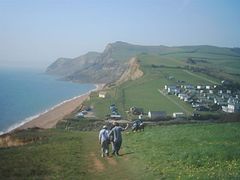Eype
| Eype | |
|---|---|
 Looking west from Eype Mouth | |
Location within Dorset | |
| OS grid reference | SY449917 |
| Unitary authority | |
| Shire county | |
| Region | |
| Country | England |
| Sovereign state | United Kingdom |
| Police | Dorset |
| Fire | Dorset and Wiltshire |
| Ambulance | South Western |
| UK Parliament |
|
Eype ( /iːp/ EEP) is a small village in southwest Dorset, England,[1] situated 1+1⁄4 miles (2 km) southwest of Bridport. It lies on the Jurassic Coast World Heritage Site on the English Channel and is within the civil parish of Symondsbury.
Eype means "steep place". Many of the village buildings can be traced back to the late eighteenth or early nineteenth centuries[citation needed], but little is known in detail until the Victorian era.
To the west of Eype Beach is Golden Cap, the highest cliff on the south coast of England at 191 m (627 ft) above sea level. In 2011 a beach hut at Eype Beach went on the market for £200,000.[citation needed]
A notable resident was the antiques dealer Paul Atterbury.[2]
St Peter's Church is regularly used for art exhibitions, known as Eype Centre for the Arts and was also used to record P.J. Harvey's Mercury prize-winning Let England Shake[3]
The village contains Eype's Mouth Country Hotel, The New Inn (operated by Palmers Brewery), Eype House Caravan and Camping Park and Highlands End Holiday Park.
References
- ^ "eype dorset, a delightful village in west dorset". Eype-dorset.co.uk. Retrieved 4 March 2012.
- ^ Chris Carson (11 December 2008). "All change at Eype as railway home goes on the market". bournemouthecho.co.uk. Archived from the original on 24 December 2013. Retrieved 4 March 2012.
- ^ http://www.dorsetecho.co.uk/news/8785310.PJ_Harvey_s_Eype_Church_album_to_be_released/
External links
 Media related to Eype at Wikimedia Commons
Media related to Eype at Wikimedia Commons

